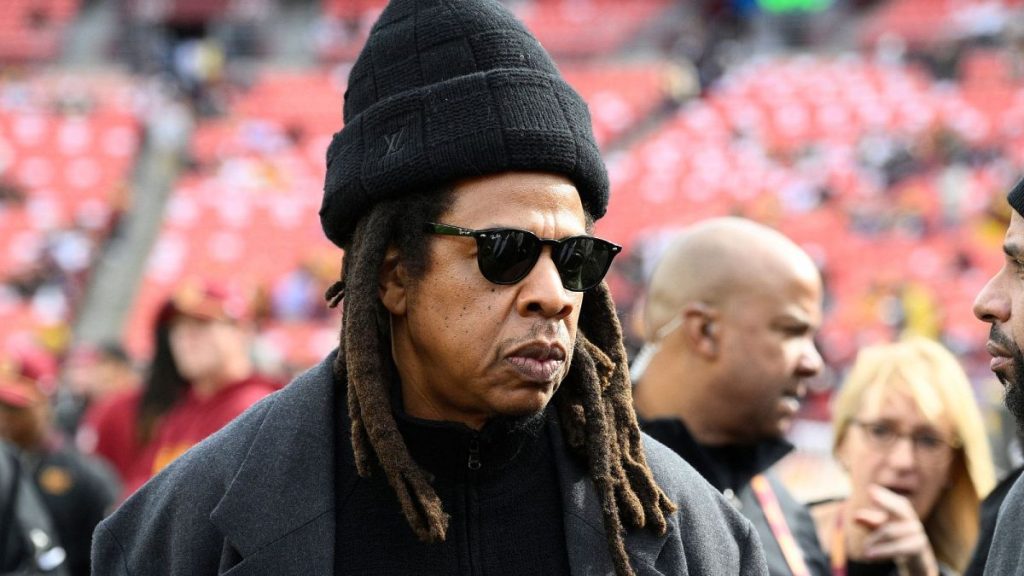A civil lawsuit filed in New York accuses rappers Sean “Diddy” Combs and Shawn “Jay-Z” Carter of raping a 13-year-old girl at an after-party following the MTV Video Music Awards in September 2000. The plaintiff, identified as “Jane Doe,” alleges that she was lured to the party under false pretenses by a limousine driver claiming to work for Combs. Upon arrival at a house described as having a u-shaped driveway, Doe was allegedly given a drink that left her feeling disoriented. The lawsuit claims that both Combs and Carter then entered the room, where Carter allegedly removed her clothes, held her down, and raped her while Combs and an unnamed female celebrity watched. Following this, the lawsuit alleges that Combs also raped the minor while Carter and the female celebrity observed. The complaint emphasizes the presence of other individuals at the party who allegedly did nothing to intervene. The lawsuit further connects Carter to other alleged similar instances involving Combs.
Jay-Z vehemently denies the allegations, characterizing them as a “blackmail attempt” orchestrated by attorney Tony Buzbee. He argues that the heinous nature of the accusations warrants a criminal complaint, not a civil one, suggesting that if the allegations were true, the perpetrators should face criminal prosecution. Jay-Z criticizes Buzbee, labeling him an “ambulance chaser” exploiting sensitive stories for financial gain. He expresses sympathy for genuine victims of such crimes, highlighting the injustice of their experiences being manipulated for profit. Jay-Z’s response through his label, Roc Nation, underscores his belief that the lawsuit is a fraudulent attempt to extort money.
Tony Buzbee, the attorney representing Jane Doe, is also involved in separate legal proceedings against Combs, representing 120 accusers in cases alleging sex trafficking and racketeering. These allegations against Combs involve claims of sexual abuse and coercion of women into drug-fueled sex parties through threats and violence. Combs’ criminal trial related to these charges is scheduled to commence on May 5, 2025. The inclusion of Jay-Z in the current civil suit significantly expands the scope of the allegations stemming from the 2000 MTV VMA after-party.
The lawsuit claims that Jane Doe, then a minor, was deliberately targeted and exploited. The alleged involvement of a limousine driver connected to Combs suggests a premeditated plan to bring Doe to the after-party. The detail about Doe signing what she believed to be a non-disclosure agreement further underscores the potential for manipulation and coercion. The allegation that she was given a drink that incapacitated her prior to the alleged assault adds another layer of vulnerability to her situation. The lawsuit paints a picture of a deliberate and coordinated effort to take advantage of a minor.
The presence of other individuals, including an unnamed female celebrity, during the alleged assaults raises questions about complicity and the potential for a culture of silence enabling such behavior. The lawsuit’s assertion that “many others were present at the after party, but did nothing to stop the assault” suggests a wider context of inaction and potential enabling of the alleged perpetrators. This aspect of the lawsuit highlights the broader implications of the accusations beyond the actions of Combs and Carter, raising concerns about the responsibility of bystanders in such situations.
This civil lawsuit against Combs and Carter unfolds against the backdrop of broader legal challenges facing Combs, including the upcoming criminal trial on sex trafficking and racketeering charges. The convergence of these legal proceedings creates a complex and interconnected legal landscape for both rappers. The outcome of the civil suit and the criminal trial could have significant implications for their careers and reputations. The serious nature of the allegations, coupled with the high-profile status of the individuals involved, ensures continued public scrutiny and media attention as the legal processes unfold.














